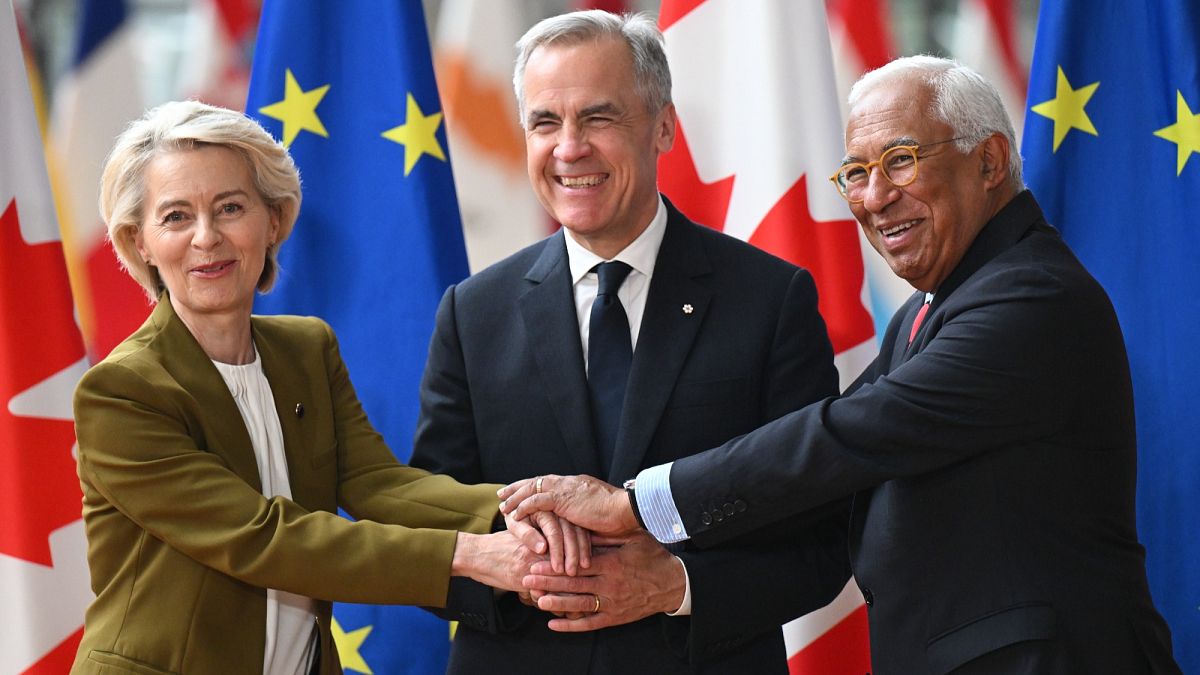The EU and Canada on Monday struck a security and defence partnership and kickstarted talks over a digital trade agreement as they seek to get closer amid uncertainty in the NATO alliance and global markets over Washington’s long-term policy.
The summit – the 20th of its kind between Brussels and Ottawa – came on the heels of a gathering of G7 leaders in Canada where one of the major headlines was the abrupt early departure of US President Donald, and on the eve of a summit of NATO leaders in The Hague.
The summit was “a powerful political statement”, European Council President Antonio Costa said after the meeting with Canadian Prime Minister Mark Carney and European Commission President Ursula von der Leyen.
“We have agreed to forge even stronger bonds,” he also said, which will see the two sides take their strategic partnership “to an unprecedented level of closeness”.
Speaking alongside him, Carney said that with the rules-based international order “under threat”, the choice for allies was either to “nostalgically look back and long for the old world order to somehow return, or we can build a new one with purpose and partnerships”.
“As the most European of the non-European countries, Canada looks first to the European Union,” he added.
EU-Canada Security and Defence Partnership
One of the main deliverables of the summit was the signing of a Security and Defence Partnership (SPD) that will allow for joint work on crisis management, military mobility, maritime security, cyber and hybrid threats, and defence industrial co-operation, as well as counter-terrorism, non-proliferation, disarmament, space policy and support for Ukraine.
According to an EU official speaking on condition of anonymity, it “is as comprehensive a framework we can offer to a third country”.
As part of the deal, Canada will also post a defence representative to the EU while the two sides also commit to explore the possibility of establishing an administrative arrangement between Canada and the European Defence Agency.
For Ottawa, it is also the first step to gain access to the EU’s €150 billion SAFE loan programme for defence procurement. A second bilateral agreement will now have to be negotiated for the country to be able to take part in joint procurement, and for its industry to participate to the same level as EU manufacturers.
Von der Leyen vowed to “swiftly launch talks” to enable Canada to join SAFE so the two sides can “define where our cooperation can have the more value added and where we should channel joint investments”.
She said the key principles underpinning the agreement will be reciprocity and security of supply.
Canada’s Carney said the partnership should help allies on both sides of the Atlantic “deliver” on their new requirements for capabilities agreed within NATO “more rapidly and more effectively”. He added that Canada would seek to boost procurement of ammunition.
Currently, about three-quarters of every dollar spent on defence goes to the US, which Carney previously said “is not smart”.
It is the second such partnership the EU has struck in a month after the UK as Washington continues to cast doubt over its long-term support to NATO allies and Ukraine as it defends itself against the Russian invasion.
It comes on the eve of a summit of NATO leaders in The Hague where allies will agree to raise the defence spending target from 2% to 5% of GDP.
New digital trade agreement
Amid trade tensions with the US, the EU and Canada welcomed the success of the CETA free trade agreement in their joint declaration. The agreement has been in force since 2017 and von der Leyen pointed out that in 2023 it generated €123 billion of trade between both sides of the Atlantic.
“CETA stands as a strong symbol of the power of free and fair trade,” she said, adding that 98% of the tariffs between the EU and Canada are zero.
Building on their 2023 Digital Partnership and the CETA, the two have officially launched negotiations on a Digital Trade Agreement. The new accord is expected to facilitate data flows and deepen cooperation on artificial intelligence, online platform regulation, cybersecurity, and digital standards.
According to the joint statement, both sides aim to align their regulatory frameworks to make online platforms safer and more inclusive, develop AI systems, and establish interoperable digital identities to facilitate interactions between citizens and businesses from both sides of the Atlantic.
They also plan to step up joint work on AI innovation, including through “AI Factories” and linking high-performance computing infrastructure.
The talks come as the EU steps up its digital diplomacy. Earlier this month, Tech Commissioner Henna Virkkunen presented the bloc’s Global Digital Strategy, which calls for deepened cooperation with trusted allies in tech development and regulation.
The Commission has already signed similar digital trade agreements with Singapore and South Korea, despite privacy advocates warning of potential risks to personal data.
The first EU-Canada Digital Partnership Council is expected to take place later this year.

